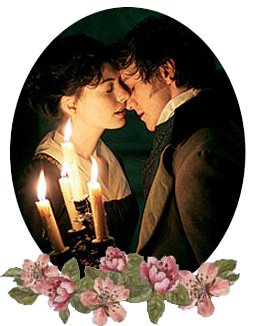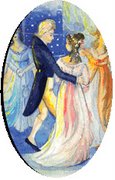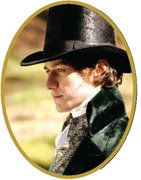Since we are on the subjects of cakes, I did a bit more research on ‘sponge cakes’. The word ‘cake’ is mentioned once in Pride and Prejudice, Mansfield Park, and Persuasion. Emma has 3 mentions and Sense and Sensibility and Northanger Abbey does not have any. Here is the one from Pride and Prejudice, Chapter 45 where Elizabeth finds herself visiting at Pemberley:

The next variation which their visit afforded was produced by the entrance of servants with cold meat, cake, and a variety of all the finest fruits in season; but this did not take place till after many a significant look and smile from Mrs. Annesley to Miss Darcy had been given, to remind her of her post. There was now employment for the whole party -- for though they could not all talk, they could all eat; and the beautiful pyramids of grapes, nectarines, and peaches soon collected them round the table.
The fruit is interesting also, especially the nectarines. I would not have thought that they were around way back then.
Next I did find a recipe for “Aunt Norris’ Spunge Cake” in the on line magazine from the Jane Austen Centre seen here:
Recipe. This recipe is said to be from Raffald’s book quoted below, but I could not find that recipe in the original edition.
The reference on that page led me to look it up and here is the complete title “The Experienced English House-keeper, For the Use and Ease of Ladies, House-keepers, Cooks, &c. Wrote purely from PRACTICE, And dedicated to the Hon. Lady Elizabeth Warburton” by Elizabeth Raffald, and published in 1769. It has a recipe for ‘Spunge Biscuits’ and just to give you some idea of what all is involved, I’ll copy the recipe here from the Google copy of 1769:
Beat the Yolks of twelve Eggs half an Hour, put in a Pound and a half of Sugar beat and sifted, Whisk it well up ‘till you see it rise in Bubbles, beat the Whites to a strong Froth, Whisk them well with your Sugar and Yolks, beat in fourteen Ounces of Flour, with the Rinds of two Lemons grated, bake them in Tin Moulds buttered, or Coffins; they require an hot Oven, the Mouth must not be stopped, when you put them into the Oven, dust them with Sugar; they will take half an Hour baking.
This is beginning to sound like what we call “sponge cake” today, but please don’t ask me to explain ‘Coffins’ or ‘the Mouth must not be stopped’ because I have no idea. Whew, what a journey, and they did all this without the benefit of our electric kitchen gadgets.
Linda the Librarian
 In chapter 21 of Emma the marriage of Mr Elton to Miss Hawkins has just been announced by Miss Bates. She says:
In chapter 21 of Emma the marriage of Mr Elton to Miss Hawkins has just been announced by Miss Bates. She says:

















































